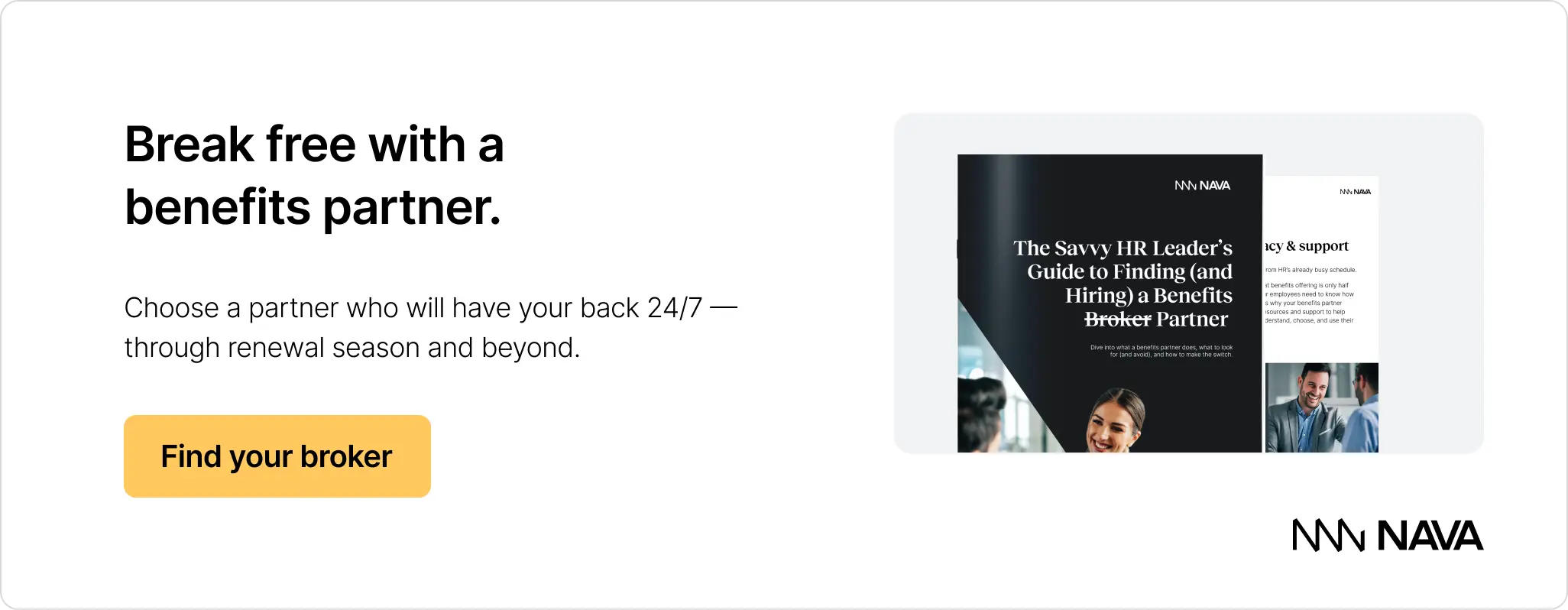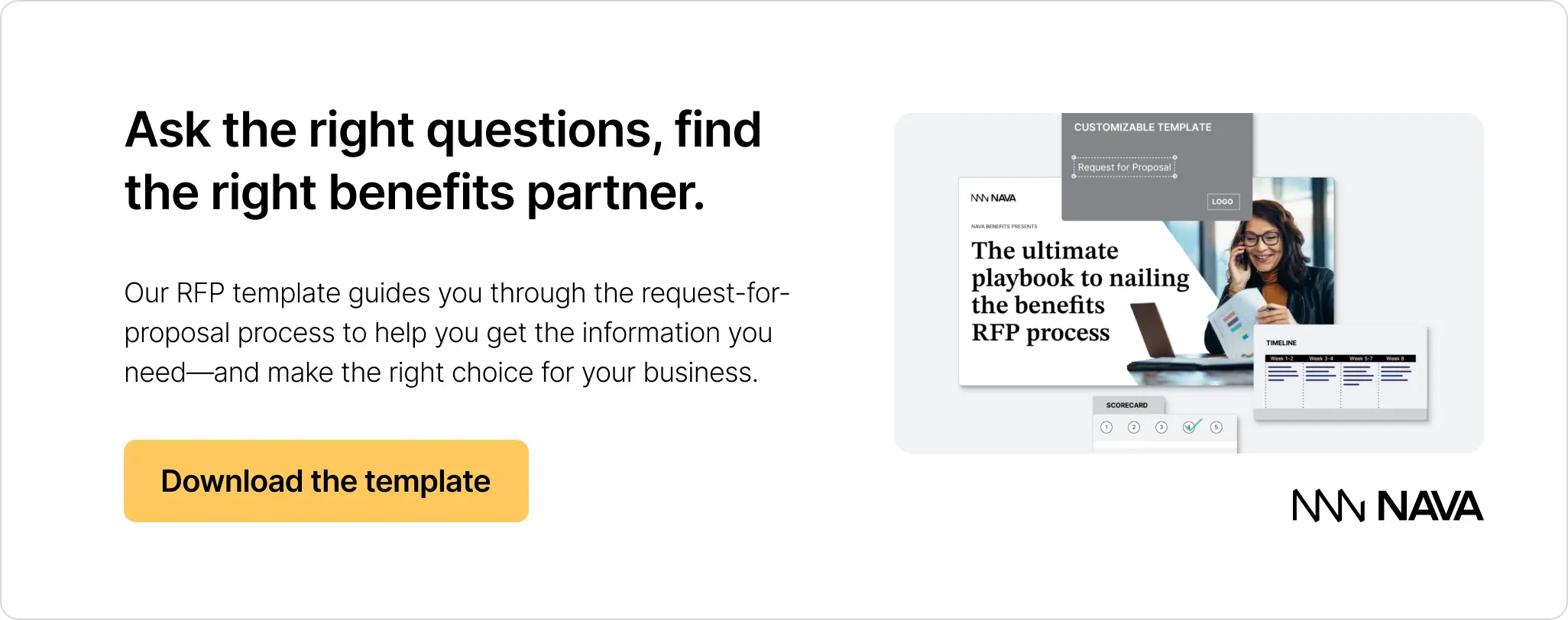7 common mistakes to avoid when hiring an employee benefits broker

Choosing the right employee benefits broker has a direct impact on your costs, compliance, and employee experience. This guide highlights the most common mistakes employers make during the selection process and offers a step-by-step checklist to help you run a stronger RFP. Use it to evaluate brokers confidently and find a partner who can support your organization year-round.
Choosing the right employee benefits broker is one of the most important decisions an employer will make. The right partner can help you control healthcare costs, support employees year-round, and reduce compliance risk. The wrong broker can create frustration, extra administrative work, and financial exposure.
This guide explains what an employee benefits broker does, the most common mistakes employers make, and a practical checklist you can use to choose the right partner.
What does an employee benefits broker actually do?
An employee benefits broker is a licensed partner who helps employers design, purchase, and manage benefits packages, including health, dental, vision, life, and disability insurance. But a quality broker does much more than gather quotes. They act as an extension of your HR team, offering year-round support, strategic guidance, and full benefits administration.
Here’s what you should expect from a top-tier benefits broker:
- Annual renewal & plan strategy: When benefits renewal season rolls around, your broker should lead the process. They analyze utilization and employee data, recommend changes or new plan structures (including alternative funding options), and negotiate rates with carriers.
- Open enrollment support & employee education: A broker should manage open enrollment, providing clear communication, educational materials, digital enrollment tools, and help employees understand their benefits so they choose and use plans wisely.
- Year-round employee support and advocacy: Benefits aren’t just a once-a-year task. Employees should be able to rely on their broker for help with claims issues, coverage questions, and general benefits guidance throughout the year. This alleviates pressure on HR.
- Regulatory & compliance management: A strong broker monitors changing regulations (like ACA and ERISA), keeps your organization compliant, and handles required filings, audits, and documentation so you don’t have to.
- Data-driven decision making & cost management: A modern broker uses utilization data, market benchmarks, and real-time analysis to recommend sustainable, cost-effective benefits strategies. They often introduce alternative funding models when appropriate.
- Transparent compensation & service disclosure: Brokers should be up front about how they’re compensated, whether via carrier commissions or flat fees, and detail the exact services included. This transparency helps build trust and ensures alignment with employer needs.
In short: a benefits broker is not just an “insurance salesperson.” The best brokers act as strategic advisors, benefits administrators, compliance watchdogs, and employee advocates, all working together to build and maintain a benefits program that serves both your business and your employees.
How is a broker different from an agent or consultant?
Although these terms are often used interchangeably, agents, brokers, and consultants serve very different functions. Here's how they compare and what that means for your organization.
Health insurance agent
- Focuses on selling insurance products
- Often represents limited carriers
- Typically transactional and quote-focused
Full-service employee benefits broker
- Represents the employer across multiple carriers
- Provides strategy, compliance, technology, and employee education
- Offers year-round support
Benefits consultant
- Often fee-based
- Brought in for plan design, benchmarking, or project-based work
Many employers need a full-service benefits broker that can also bring consultative support when needed.

What mistakes do employers make when choosing a benefits broker?
A benefits broker has a major influence on your organization’s costs, compliance, and employee experience. Avoid these common mistakes to ensure you’re choosing a partner who can deliver real strategic value.
1. Failing to evaluate a broker’s true benefits expertise
Assuming all brokers offer the same capabilities can lead to misalignment.
Risk:
- Inefficient plan design
- Missed cost-saving opportunities
- Limited support for your industry or workforce
What to look for:
- Experience with companies similar to yours
- Knowledge of your funding model (or funding model you’d like to start working toward)
- Examples of measurable improvement for clients
2. Confusing a health insurance agent with a full-service benefits broker
An agent may focus only on plan selection, which is generally not enough for growing employers.
A full-service broker should also provide:
- Compliance support (ACA, ERISA, COBRA, 5500s)
- Benchmarking and claims analysis
- HR tech integrations
- Employee communication
- Year-round strategic planning
If your broker is not proactive and analytical, they may be acting more like a carrier-focused agent.
3. Overlooking technology and administration tools
Technology is now a core differentiator among modern benefits brokers.
Warning signs:
- Manual paperwork
- No employee-facing portal
- Limited plan performance visibility
What modern brokers provide:
- HRIS and ben-admin integrations
- Online and mobile enrollment
- Dashboards with cost and trend data
- Automated carrier feeds
4. Underestimating the importance of compliance support
Compliance support is essential, especially for employers that are growing or multi-state.
Your broker should support:
Questions to ask:
- “How do you help us stay compliant year-round?”
- “What support do you provide for filings and notices?”
5. Misunderstanding the broker’s service model
Avoid surprises by clarifying service expectations up front.
Clarify:
- Your account team and points of contact
- Response times
- Escalation paths
- Support during onboarding, open enrollment, and renewals
A strong broker functions like an extension of your HR team, and the RFP process is the ideal time to confirm what that partnership actually looks like day-to-day. Digging into roles, response times, communications, and service expectations upfront helps prevent gaps in support later.
6. Prioritizing price over value
Lowest cost rarely means best fit. A broker’s fee is only one part of the equation. The real value lies in the strategy, compliance support, and year-round guidance they provide — areas that can significantly impact both costs and employee experience.
Risks:
- Limited strategy
- Outdated tools
- Minimal support for HR
Evaluate value based on:
- Hours saved for HR
- Employee experience
- Renewal performance
- Multi-year cost control
7. Failing to use data to measure broker performance
Data should drive benefits strategy, not guesswork. A strong broker uses claims trends, benchmarking, and employee demographics to recommend targeted changes that improve both cost control and plan value.
A broker should provide:
- Claims utilization and trend analysis
- Renewal modeling
- Benchmarking
- Actionable recommendations
If you never see dashboards or reports, it’s hard to assess performance.
How to choose the right employee benefits broker: a step-by-step checklist
Choosing the right employee benefits broker can feel overwhelming, but a structured evaluation process makes the decision much easier. Use this step-by-step checklist to assess each broker consistently and identify the partner who best fits your organization’s needs.
1. Evaluate experience and specialization
- Ask about experience with similar companies
- Confirm expertise with your funding model
- Review sample outcomes
Questions to ask:
- “Can you share case studies from employers like us?”
- “Where are you the strongest fit in terms of industry, company size, and workforce needs?”
- “Can you provide references from similar clients?”
2. Review technology capabilities
- Request demos of enrollment systems and dashboards
- Assess accuracy and integration capabilities
Questions to ask:
- “Which HRIS platforms do you integrate with?”
- “How will employees access their benefits?”
3. Understand carrier relationships
- Confirm they negotiate competitively
- Learn how they maintain employer advocacy
Questions to ask:
- “How do you decide which carriers to recommend?”
- “How do you advocate for us with carriers?”
4. Assess the service model
- Clarify support throughout the year
- Ask how they manage busy seasons
Questions to ask:
- “Who will be on our service team?”
- “What are your response time expectations?”
5. Confirm compliance support
- Verify ACA, ERISA, COBRA, and 5500 support
- Ask about monitoring regulatory changes
Questions to ask:
- “Who leads your compliance function?”
- “What does your compliance roadmap look like?”
6. Review fee structure and transparency
- Understand compensation
- Clarify what’s included and what’s not
Questions to ask:
- “How do you avoid conflicts of interest?”
- “What services are included in your base model?”

FAQs about hiring a benefits broker
What is an employee benefits broker?
An employee benefits broker is a licensed professional who helps employers design, choose, and manage benefits plans. Brokers support plan evaluation, carrier negotiation, compliance, renewals, and employee education.
How do I evaluate a benefits broker?
Focus on their expertise with similar employers, technology capabilities, compliance support, service model, and data-driven approach. You should also conduct a structured RFP to compare brokers consistently and ensure you’re selecting a partner who can meet your organization’s needs.
What should small businesses look for in a benefits broker?
Small businesses should prioritize hands-on support, modern tools, competitive plan options, and clear communication.
What’s the difference between a broker and a consultant?
A broker typically manages renewals, negotiates with carriers, and oversees ongoing plan administration, while a consultant focuses on strategy, plan design, and specialized projects. The strongest brokers combine both functions, offering hands-on administration alongside deeper strategic guidance.
Partnering with the right employee benefits broker
Choosing the right broker affects cost control, compliance, HR workload, and employee satisfaction. By avoiding common mistakes and following a structured evaluation process, you can select a partner who delivers consistent value and strategic support.
If you’re looking for a modern, strategic benefits brokerage that combines expert guidance with powerful technology and year-round support, our team is here to help. Contact us to schedule a consultation.
Key takeaways
- Your benefits broker should provide strategy, compliance support, and technology.
- Avoid choosing a broker solely based on price; focus on long-term value.
- Use a structured evaluation checklist when comparing brokers.
.webp)




.webp)

